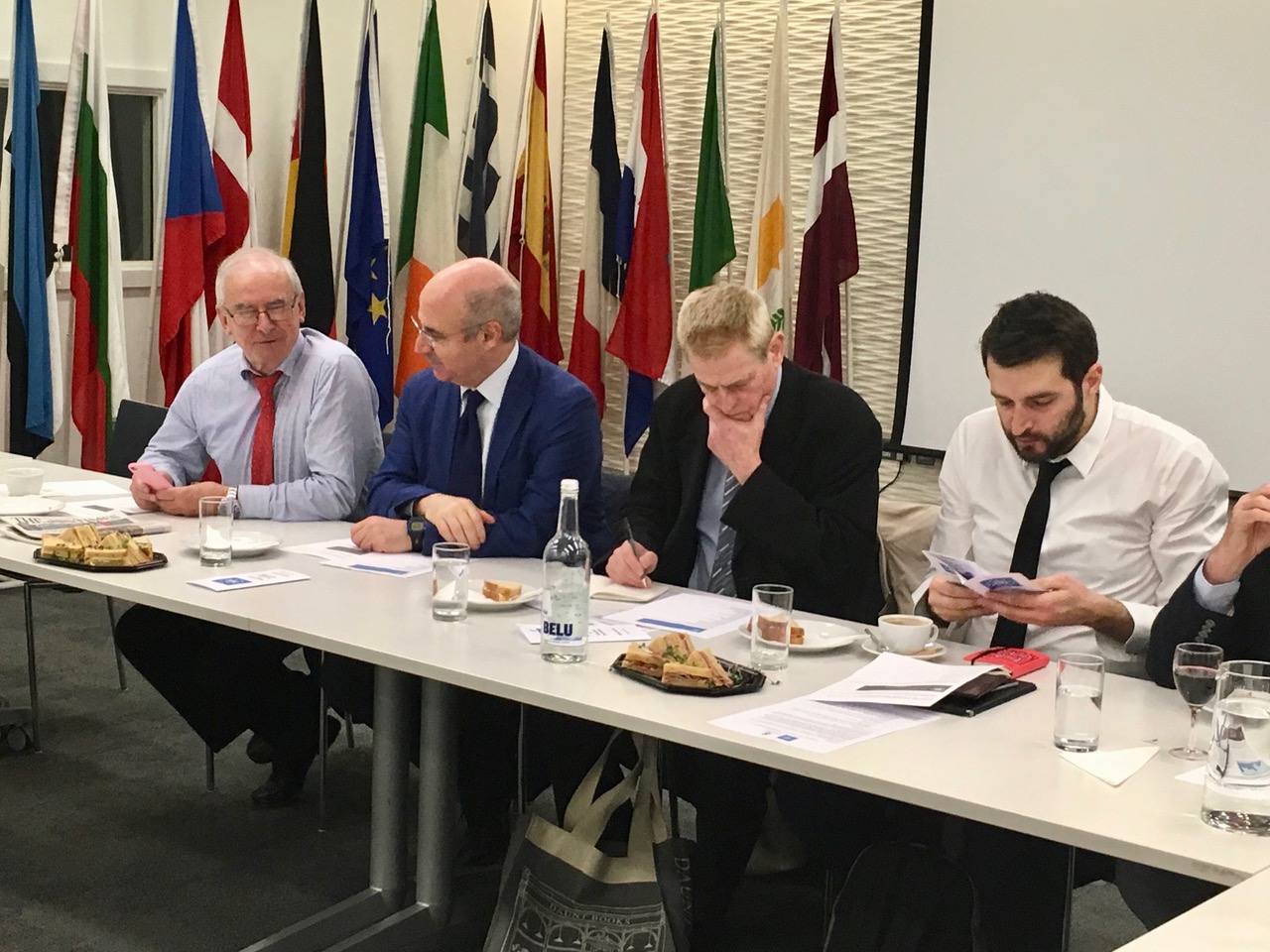Digesting Brexit and Donald Trump and their impact on the UK, international relations and global security caught the attention of much of the media through 2017 and was reflected in the AEJ’s guest list.
9 November 2017
Lord Andrew Adonis – Stopping Brexit
Lord Andrew Adonis says it’s time to stop Brexit.
And 7 weeks after outlining concerns to the AEJ, he underlined them in Christmas week by resigning as infrastructure tsar for the Conservative government of Theresa May.
At an AEJ-UK lunch meeting on Nov. 9 2017, the Labour peer and former Labour minister for education and for transport offered even odds on reversing the current political process to exit the European Union. Speaking while he was still chair of the UK Infrastructure Commission, Lord Adonis said the next 18 months are crucial.
For more on his analysis to the AEJ-UK please see this report from AEJ member and former FT correspondent Peter Norman.
12 October 2017
Paddy Ashdown, former Liberal Democrat Leader – Brexit will not happen…
says Paddy Ashdown, former leader of the Liberal Democrats and now the party’s leading elder statesman.
As recently as July 2017, Lord Ashdown of Norton-sub-Hamdon – Liberal Democrat leader from 1988 to 1999 and a bitter opponent of Brexit – expected Brexit to take place.
But he has changed his mind and thinks Brexit will not happen.
Speaking to the AEJ’s lunchtime meeting on 12 October 2017, he painted a grim picture of a dysfunctional UK government that is incapable of negotiating a satisfactory withdrawal from the EU and which could collapse next year.
By a narrow margin, he believes Britain will stay in the EU but retreat from an active international role and lose global influence.
Drawing on his many and varied experiences as a Royal Marine, intelligence officer, diplomat, politician and international administrator, Lord Ashdown also commented on a range of international issues in this “most dangerous, volatile and frightening age” of his lifetime.
Please see this summary of his remarks from AEJ member and former FT correspondent Peter Norman.
15 September 2017
Lord John Kerr of Kinlochard – Article 50 can be stopped or revoked
The author of Article 50, Lord John Kerr of Kinlochard, says negotiators for both the UK and the EU have made fundamental mistakes and become mired in public disagreements.
And he warned of a “precipice” in the UK’s relations with the EU if the talks end without agreement.
At a meeting of the AEJ UK on September 15 2017 he also said there is nothing in the law to prevent the UK from changing its mind and stopping or revoking the process of UK exit from the EU.
It’s by no means the first time he’s said this but at the AEJ UK meeting he spelled out his analysis of the Brexit process in forensic detail.
A former head of the UK Foreign Office and a cross-bench (independent) peer since 2004, Lord Kerr has emerged as a severe critic of the UK government’s approach to Brexit.
He has called for a halt to the Brexit process and a national debate in the UK to think again about leaving the EU, previously describing the UK government’s actions since the referendum as “a completely wasted year while the Tories negotiated with themselves”.
Known in Brussels as a wily and effective negotiator, Lord Kerr held senior posts in the UK Treasury as well as the Foreign Office. He was UK ambassador to the EU and the U.S. before taking the top Foreign Office job in 1997. In 2002/3, after retiring as a UK diplomat, he was secretary general to the European Convention, where he drafted the EU exit clause that became Article 50.
See this detailed report by AEJ UK chairman William Horsley and an audio recording of the meeting.
Lord Kerr article on Politico
Blunders on both sides?
15 June 2017
Thomas Rid
Professor in Security Studies at the War Studies Department of Kings College London. He spoke off the record about disinformation attacks by nations. For more you can see his blog.
23 May 2017
Jan Halper-Hayes
A member of the Donald Trump presidential transition team and former UK chairman and worldwide vice president of Republicans Overseas provided an off the record report of recent Republican party policy meetings in Washington.
6 April 2017
Dominique Moisi
Just two weeks before the first round of the 2017 French presidential elections the veteran political scientist and columnist said it was the most unpredictable and most important election he could remember in a lifetime of observing and analysing French politics and international affairs.
And, he added, if Brexit is likely to damage the EU then a victory for Marine le Pen and her far-right Front National would have been far worse.
On top of the “anger, fear and nostalgia” that has fuelled the last year’s two major political shocks – the UK Brexit vote and Donald Trump’s election – France had two additional unpredictable elements – high levels of voters who were undecided and others who were expected to abstain from voting.
For more on Moisi’s outline of the state of the French politics please see this report from AEJ member Quentin Peel, this audio record of Moisi’s presentation and following questions and answers, and Moisi’s own recent article.
13 March 2017
Jim O’Neill
Donald Trump’s advisers are “stuck in the dark ages” and the UK government of Theresa May has yet to “get real” about Brexit says the man dubbed the high priest of globalisation.
Jim O’Neill is the former chief economist of Goldman Sachs who coined the term BRICs in 2001 for the rising economies of Brazil, Russia, India and China; a former Treasury minister in David Cameron’s Conservative government; and one of the world’s pre-eminent proponents of globalisation.
He says the populist politics of Brexit and Donald Trump are hostile to further growth and out of sync with world economic trends. Despite much of the political rhetoric surrounding both Trump and Brexit – and from other political leaders – he says world economic growth is not slowing, noting that in this decade it is in line with performance in the 1980s and 1990 and “not as weak as often perceived” by western leaders.
For more on his nuanced and informed briefing to the AEJ UK on March 13 please see this report on the meeting from AEJ member and former FT correspondent Peter Norman; and here for an audio record of Lord O’Neill’s remarks and following questions and answers.
And for more of his comments on Brexit see this report on Politico.
On the wider issue of globalisation, Lord O’Neill of Gatley has recently been arguing in articles and on a BBC radio series for a re-examination and urging business leaders to address issues which have left vast numbers of industrial workers and regions in the western world reeling and disaffected.
15 February 2017
Vernon Bogdanor
One of Britain’s foremost constitutional experts says last year’s referendum vote for Brexit shows that Britain is a totally different country from its continental neighbours.
Vernon Bogdanor, a historian and constitutional adviser to a number of governments around the world, explains the vote as the result of a long-simmering cultural revolt.
In a wide ranging interpretation of the Brexit vote and its ramifications Prof. Bogdanor also said that it endangers stability in Northern Ireland; Leave voters are likely to suffer most from the consequences of Brexit; current political leaders in England are deceived about the deal they can reach; and there is still a possibility that the Brexit process can be aborted.
Prof. Bogdanor is research professor at the Institute for Contemporary British History at King’s College London, and former professor of government at Oxford University and senior tutor and vice-principal at Brasenose College. He was awarded a CBE for services to constitutional history in 1998 and is a Fellow of the British Academy.
For more on this meeting of the AEJ UK on Feb.15, please see this report from AEJ UK Chairman William Horsley.
27 January 2017
General Sir Richard Barrons
Recently retired head of UK Joint Forces Command and one of Britain’s most respected and formerly highest ranking soldiers.
At the AEJ UK’s first meeting of 2017 he asked are we safe?
In the UK this has not really been a major question – political or military – for the last 25 years. But it’s high time to re-think that said Sir Richard.
He argued that we need a major strategic revamp and new vision in a striking analysis of the strategic gaps and weaknesses in UK and European defences and what he saw as profound failures of strategic decision-making in recent years.
In the wake of Donald Trump’s election in the USA, the Brexit vote in the UK, and further political backlash to be expected in other European countries, he provided a military analysis of a world where Russia and China have already updated their strategy to combine rapid strike capabilities with cyber warfare.
A strategy to protect their own territory and control nearby foreign space, and to use cyber attacks and psychological means to disrupt potential adversaries.
A strategy that can be seen militarily in Russian actions on its own borders and China’s buildup in the South China Sea, digitally in alleged Russian interference in the recent U.S. election of Donald Trump and multiple suspected Chinese cyber attacks against western corporations, and politically in Russian antagonism to NATO and the EU and China’s stance in southeast Asia.
It’s also a more volatile world where even the so-called new leader of the free world Donald Trump could represent a potential threat to peace – in these reports from the AEJ meeting in Australia’s Sydney Morning Herald and the UK’s Independent newspaper.
Sir Richard acknowledged his analysis has found no consensus yet in top UK or European military or political circles. But he did believe some key Trump cabinet members who were friends and colleagues from Iraq and Afghanistan – Defence Secretary General James Mattis and Head of Homeland Security retired Major-General John Kelly – understand the strategic challenge.
Here is a full audio record of Sir Richard’s analysis with the questions and answers afterwards.
And for photos please see our Facebook page





